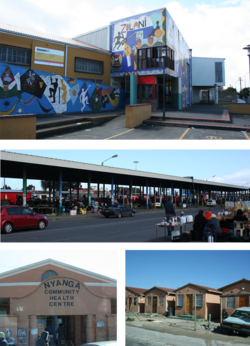Nyanga | |
|---|---|
 Top: Zolani Recreational Centre. Middle: Nyanga taxi rank. Bottom left: Nyanga Community Health Centre. Bottom right: government built RDP houses that are common in the area. | |
| Coordinates: 33°59′S18°35′E / 33.983°S 18.583°E | |
| Country | South Africa |
| Province | Western Cape |
| Municipality | City of Cape Town |
| Main Place | Cape Town |
| Area | |
• Total | 3.09 km2 (1.19 sq mi) |
| Population (2011) [1] | |
• Total | 57,996 |
| • Density | 19,000/km2 (49,000/sq mi) |
| Racial makeup (2011) | |
| • Black African | 98.8% |
| • Coloured | 0.3% |
| • Indian/Asian | 0.1% |
| • White | 0.2% |
| • Other | 0.7% |
| First languages (2011) | |
| • Xhosa | 90.2% |
| • English | 3.0% |
| • Sotho | 1.6% |
| • Other | 5.1% |
| Time zone | UTC+2 (SAST) |
| Postal code (street) | 7755 |
| PO box | 7750 |
Nyanga is a township in the Western Cape, South Africa. Its name in Xhosa means "moon" and it is one of the oldest black townships in Cape Town. In 1948, [2] Athlone was declared a coloured-area, resulting in the forced removal of black residents, who were forced to settle in Nyanga near Langa.
Contents
Nyanga is situated 20 km (12 mi) from Cape Town along the N2 highway, close to the Cape Town International Airport and next to the townships of Gugulethu and Crossroads.



